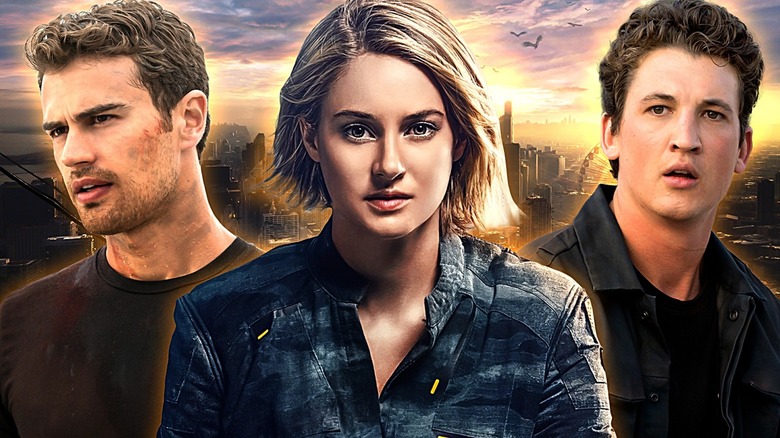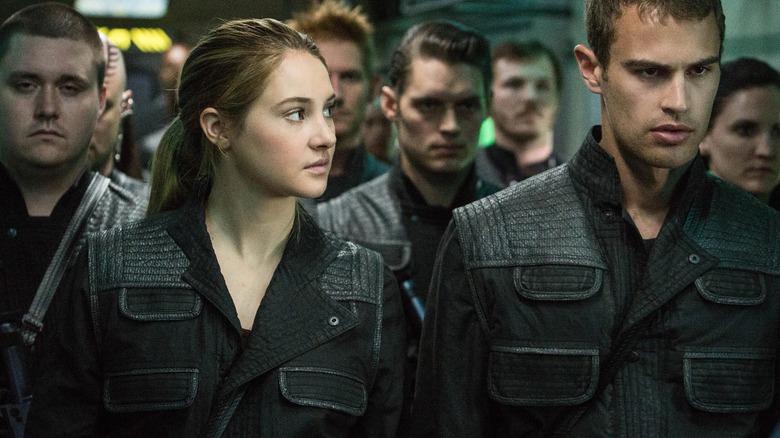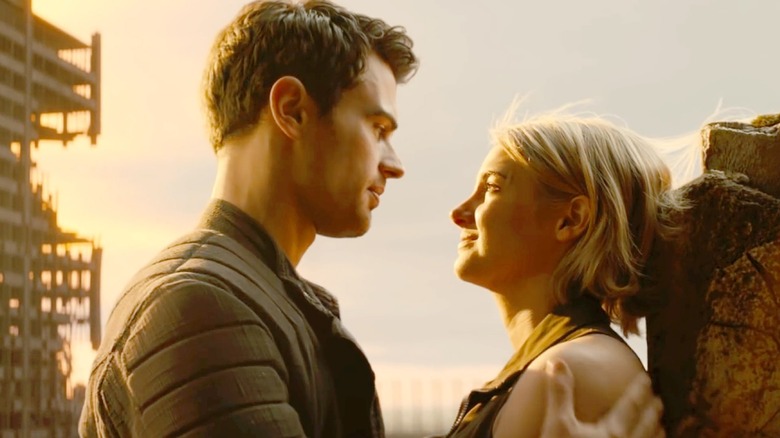The Correct Order To Watch The Divergent Movies
This post contains spoilers for the "Divergent" trilogy.
The "chosen one" trope is a staple of young adult fare, through some franchises have made an effort to subvert it. For instance, "The Hunger Games" protagonist Katniss Everdeen is meant to embody the Mockingjay throughout "The Hunger Games" series, but she consistently detests being used as a revolutionary symbol for political propaganda. A similarly subversive figure emerges in Veronica Roth's "Divergent" book series, where Beatrice "Tris" Prior is initially presented as an anomaly within the system — with facets of the "chosen one" formula guiding her arc — only to be revealed as just one of many such anomalies. What really makes her stand out is being brave enough to challenge the status quo.
When director Neil Burger's adaptation of Roth's first book, "Divergent," was released in 2014, the film received mixed reviews from critics but did pretty well at the box office. Shailene Woodley's Tris felt fleshed out enough to ground the adaptation, which takes a rather bland approach to the source material. "Divergent" was followed by two sequels, "Insurgent" and "Allegiant," but the decision to split the third novel into two movies ultimately doomed the series and robbed it of a proper ending.
Although the watch order for the "Divergent" trilogy is pretty straightforward, it is worth looking at the missed opportunities that each entry should have capitalized on, and what the fourth canceled "Divergent" film ("Ascendant") might have added to the chronology of this dystopian tale. Without further ado, let us venture into a world ruled by factions, where expressing individuality is the greatest sin, but experiencing a crisis of identity is an even greater crime.
The Divergent story starts with (you guessed it!) Divergent
Start with 2014's "Divergent," which introduces us to post-apocalyptic Chicago. The aftermath of an unexplained war has led to the creation of five factions, which function as social indicators of personal and collective identity. Abnegation is for the selfless, who live monastic lives removed from capitalistic overindulgence, Erudite is for those who value knowledge and pioneer scientific progress, and Candor is for those who value the truth above all else. If someone chooses Amity, they value peace and favor political neutrality, while the Dauntless are described as fearless and are officially in charge of the city's security. Tris is forced to navigate these rather limiting factions as a rogue cog who refuses to fit into the machine, and her Divergent status puts her in immense danger.
There are some intriguing aspects to "Divergent" that could have been explored in the sequels to great effect, such as the direct correlation between state-led surveillance and societal identity. Although Tris is our lens for navigating this world, her field of vision beyond the first "Divergent" film feels extremely limited and is rarely invested with the fleeting depth that the novel series builds its foundation on. The inability to fit into boxed categories results in complete societal exclusion — leading to the factionless being exempted from integration — but the adaptations do not dwell on this aspect well enough, if at all. The "Divergent" films also missed out on the opportunity to improve upon Roth's sketchy worldbuilding in the books.
Insurgent is the second Divergent movie, Allegiant is the third
After watching "Divergent," move on to "Insurgent," which explores the aftermath of the coup and sees Tris in graver danger as the government declares Divergents to be societal threats who need to be eradicated. Tris is not the only Divergent, of course; Tobias/Four (Theo James) is also one, hinting at a deeper conspiracy behind a system so obsessed with erasing individuality but hell-bent on defining the human spectrum with only one overarching quality. Although parts of "Insurgent" sag under the weight of an overstuffed script, it feels more profound than its predecessor, as it does the legwork to competently grapple with some of its core themes. As bare minimum as that sounds, it is undoubtedly better than "Allegiant," the next and final destination of this watch order.
The first issue with "Allegiant" is that it only tells half a story due the book being split into two planned movies. However, the real reason why "Allegiant" officially put an end to the franchise lies in its noticeable drop in quality. The convoluted nature of the story emerges as neither visually arresting nor thematically entertaining enough for audiences to even bother with what happens next. The canceled film, "Ascendant," intended to explore Tris' attempt to expose a horrifying genetic experiment, which eventually leads to her death. This marks a turning point in Tobias' arc, and the advent of a new future thanks to Tris' sacrifice.
Had "Allegiant" incorporated the entirety of the novel's arc in its final installment, the film wouldn't have ended on a cliffhanger, but there is some comfort in knowing that we're probably not missing out on much. After all, there is no dearth of better YA adaptations that explore growing pains and fissures within personal identity.


